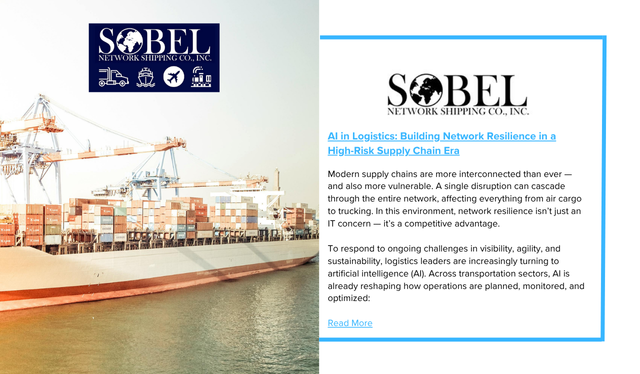Modern supply chains are more interconnected than ever — and also more vulnerable. A single disruption can cascade through the entire network, affecting everything from air cargo to trucking. In this environment, network resilience isn’t just an IT concern — it’s a competitive advantage.
To respond to ongoing challenges in visibility, agility, and sustainability, logistics leaders are increasingly turning to artificial intelligence (AI). Across transportation sectors, AI is already reshaping how operations are planned, monitored, and optimized:
-
Air freight providers are automating scheduling, booking, and forecasting. AI helps teams predict cargo peaks and optimize load handling in advance.
-
Rail freight systems are using AI to analyze historical and real-time data to improve load balancing, reduce empty car movements, and maximize efficiency.
-
Trucking fleets are applying AI to optimize routing and reduce carbon emissions by factoring in traffic, weather, and delivery windows.
Yet even as AI drives efficiency, it introduces new dependencies. Many logistics teams are now reliant on AI systems for everyday operations — meaning a network outage could grind processes to a halt.
The Risks of AI Dependence During Outages
When AI services are interrupted due to internet provider failures, cyberattacks, or configuration errors, companies risk lost shipments, financial penalties, and dissatisfied customers. Worse, many teams have become so reliant on AI systems that manual backup procedures may no longer be second nature.
Ironically, as AI systems grow more complex, they may contribute to outages. High-speed data transfers and real-time applications can stress network infrastructure, leading to latency, bottlenecks, and breakdowns.
Out-of-Band Management: A Critical Safeguard
To protect against disruptions, forward-thinking logistics operations are investing in out-of-band (OOB) network management. OOB infrastructure provides a separate, secure management path, allowing IT teams to access and repair systems even when the main network is down.
This independent channel ensures that critical systems — like those powering AI applications — remain controllable during outages. OOB management allows companies to:
-
Perform remote firmware updates and resets
-
Enforce security policies without disrupting operations
-
Avoid costly on-site technical support
As logistics increasingly depends on digital technologies like IoT, machine learning, and cloud computing, OOB management provides a foundation of true network resilience — not just recovery, but continuity.
Why It Matters for Supply Chain Leaders
For Sobel clients and global supply chain professionals, the stakes are high. AI is streamlining operations, but only strong network architecture ensures that those tools remain available when they’re needed most. In a sector defined by timing and trust, resilience is not optional.


